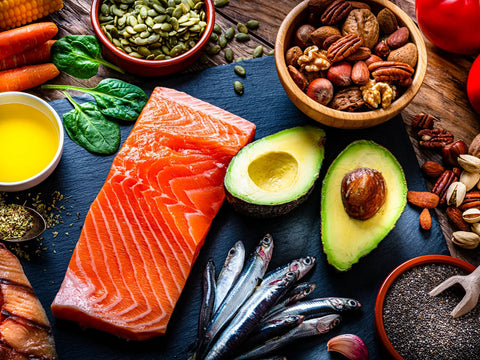6 Tips to increase your Testosterone Naturally
Written by Zeynep Özdemir - Certified Dietitian Nutritionist
Testosterone plays a vital role in health, impacting muscle strength, sexual function, and disease resistance. Understanding scientifically-backed methods to enhance its production naturally can significantly improve quality of life.
This article provides valuable insights into proven strategies to help you boost natural testosterone levels. Keep reading to learn more!
1. Optimize Your Diet
The food you consume plays a crucial role in regulating testosterone and other hormone levels. A balanced intake of proteins, fats, and carbohydrates is essential for hormonal health.
Research indicates that diets rich in protein help maintain healthy testosterone levels and aid in fat loss, which is linked to testosterone (1).
Moreover, healthy fats are vital; studies show that diets low in fat can lead to reduced testosterone levels (2).
By maintaining a diet based on whole foods with balanced macronutrients, you can support optimal hormone function.
Here's a deeper look into how you can optimize your nutrition for hormone health:
- Protein Intake:
Ensure your diet includes lean meats, eggs, and plant-based proteins such as beans and legumes to support hormone health (1).
- Healthy Fats:
- Carbohydrates:
Carbs play a significant role in regulating testosterone levels by influencing insulin production, which in turn affects testosterone synthesis.
Include complex carbohydrates like whole grains, fruits, and vegetables, which help maintain optimal testosterone levels and overall health.
- Avoid Overeating or Excessive Dieting:
Maintaining a balanced calorie intake is crucial as overeating and constant dieting can disrupt hormone levels, including testosterone.
Ensuring a balanced diet without extreme calorie restrictions or excess can help stabilize testosterone levels (3, 4, 5)
- Regular Meals:
Eating meals at regular intervals can help regulate your body’s energy levels and maintain stable insulin levels, which in turn supports balanced testosterone levels. Avoid long periods of fasting or skipping meals, as this can disrupt your hormonal balance.

2. Regular Physical Activity
Physical activity is not only a cornerstone of general health but also a powerful means to boost natural testosterone.
Resistance training, such as weightlifting, has been shown to increase testosterone levels in the short term (6).
High-intensity interval training (HIIT) also proves effective, though all exercise types offer some benefit (7, 8).
Regular engagement in physical activities, particularly those that are intense and involve muscle building, can significantly elevate natural testosterone production.

3. Manage Stress and Sleep Quality
Long-term stress elevates cortisol, which negatively affects testosterone levels. Managing stress through techniques like mindfulness and yoga, along with ensuring sufficient sleep, helps maintain hormone balance (9, 10). It's also crucial to manage your sleep, as lack of rest can significantly lower testosterone levels.
Studies suggest that ideal sleep varies, but typically, around 7 to 9 hours per night is recommended for optimal hormonal health (11, 12).
4. Vitamin and Mineral Supplements
The role of specific vitamins and minerals in maintaining and potentially increasing testosterone levels is significant, supported by a range of scientific studies. Key nutrients that are often highlighted include Vitamin D, zinc, and magnesium, each playing a unique role in hormonal health.
Vitamin D
Vitamin D is crucial not only for bone health but also for optimal hormonal function. This vitamin acts almost like a hormone itself and has receptors in many different body tissues. Vitamin D deficiency is widely prevalent, particularly in regions with limited sunlight exposure, affecting up to 1 billion people globally (13, 14).
Studies have consistently shown a correlation between higher Vitamin D levels and increased testosterone levels. One 2017 study found that supplementing Vitamin D in deficient men increased their testosterone levels significantly (15, 16). This makes regular sunlight exposure or supplementation an essential consideration for those looking to maintain or boost their testosterone levels
Zinc
Zinc is another critical mineral, especially known for its role in immune function, cell division, and overall growth. The connection between zinc and testosterone is particularly strong; deficiencies in zinc have been linked to lowered testosterone levels.
Zinc supplementation has shown benefits in increasing testosterone levels in those who are deficient. For instance, one study demonstrated that zinc supplementation effectively increased testosterone levels in men and postmenopausal women who had low zinc status (19, 20). This suggests that ensuring adequate zinc intake through diet or supplements could be beneficial for maintaining healthy testosterone levels.
Magnesium
Magnesium also plays a role in supporting testosterone production. It's involved in over 300 biochemical reactions in the body and helps regulate various bodily functions including muscle and nerve function, blood sugar levels, and blood pressure.
Studies have indicated that magnesium supplementation can elevate testosterone levels, particularly when combined with regular exercise. Men participating in a study who received 10 mg of magnesium per kilogram of body weight showed increased testosterone levels compared to a control group (21).
5. Avoid Certain Environmental Toxins
Exposure to certain chemicals like BPA and parabens, found in plastics, can decrease testosterone levels. Reducing exposure to these endocrine disruptors can be beneficial for maintaining your hormonal health (22, 23).
6. Regular Medical Check-Ups
It's essential to regularly monitor your hormone levels through medical checkups to ensure that any approach is effective and safe. Personalized advice from healthcare professionals is crucial as individual health conditions vary.
Summary on How to Increase Testosterone Naturally
Boosting your testosterone levels naturally involves a combination of dietary changes, regular exercise, stress management, careful supplementation, and avoidance of certain environmental toxins. Always consult with a healthcare professional before starting any new health regimen to tailor these suggestions to your personal health needs.
Discover the Main Benefits of Testosterone
Nullure's Natural Testosterone Booster
You can buy Nullure's Natural Testosterone Booster and benefit from a natural food supplement for supporting a healthy testosterone production



2 comments
Tengo tiroides tomo eurotirox 75 gramos es poco pero me afectar
Thank you for providing such a comprehensive and practical guide. Your blog has become a valuable resource for me, and I’m sure it will help many others on their journey to better manage High cholesterol. Looking forward to more insightful content from you.